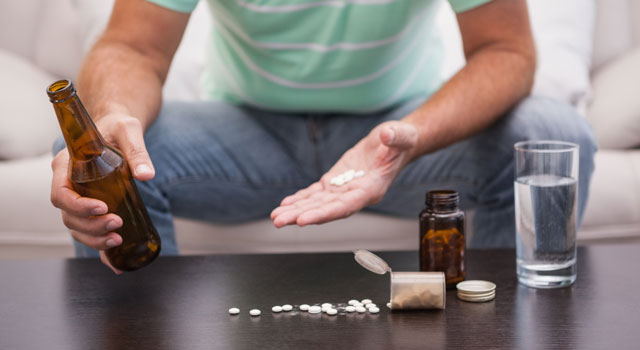Using multiple substances at the same time, also known as polydrug use, can sometimes be very dangerous. Polydrug use is never considered safe, but some substances can be deadly and should never be used together. Polydrug use is very common because one drug can increase the effects of the other, resulting in a more powerful high. One of these popular and dangerous combos is alcohol and benzos, like Xanax. This cocktail can have a range of harmful side effects, which potentially could lead to death. Despite the dangers, mixing alcohol and benzos is popular among teens and young adults, mostly due to pop culture. The reason it is so popular is that taking a small amount of benzodiazepines can make one drink feel like several. Its popularity also stems from the misconception that prescription medications are not dangerous.
The National Institute on Drug Abuse (NIDA) has found that people who abuse benzos typically have another primary drug of choice. This in itself shows the popularity of polydrug use when it comes to drugs like Xanax. Benzodiazepines are often abused in conjunction with either alcohol or prescription opioids. Benzos are central nervous system depressants, so when they are mixed with other depressants like alcohol or opioids, the ‘high’ from depressants is increased significantly.
Depressants cause a slower heart rate and depressed respiratory system. The more depressants that are taken, the more pronounced these effects become. Eventually, the respiratory system can completely fail, causing unconsciousness and eventually cardiac arrest. Mixing depressants in any form is one of the most dangerous drug combinations and should never be experimented with. Mixing depressants is also proven to increase the likelihood of prolonged substance abuse and physical dependency. Here are some of the immediate dangers of mixing alcohol and benzos:
-
Overdose
The risk of overdose is significantly higher when mixing alcohol and benzos. This is because benzos multiply the effects of alcohol. The amount of alcohol needed to result in alcohol poisoning is much lower when a person is under the influence of any benzodiazepine. The risk of benzo overdose is also increased, which would cause respiratory failure, leading to organ and brain damage caused by lack of oxygen in the blood. Popular benzos include Xanax (alprazolam), Ativan (lorazepam), Klonopin (clonazepam), and Valium (diazepam). All of these drugs specifically state on the bottle to never consume alcohol while taking them.
-
Enhanced Effects
As mentioned above, mixing alcohol and benzos enhances the effects of both of the drugs. If you are someone who is sensitive to the effects of alcohol, having even one drink while taking benzos can make you feel like you are completely drunk. This can be unexpected and dangerous, especially if you are in an unfamiliar place or plan on driving.
-
Decreased Motor Skills
Coordination is significantly reduced while mixing alcohol and benzos. Reaction time is reduced, which makes driving especially dangerous. Any physical activities can become a danger while under the influence of multiple depressants.

-
Reduced Cognition
A reduction of cognitive abilities is extremely common among those mixing alcohol and benzos. Reduced cognition is already a side effect of both of these drugs, so this side effect is multiplied during polydrug use. Reduced cognition can result in a loss of inhibitions that can lead to accidents, significantly reduced reasoning abilities, an inability to control one’s emotions that can result in becoming hostile or aggressive, and impaired judgment that can lead to poor or risky decisions.
-
Blackouts
Blackouts, or temporary amnesia, is one of the most common side effects of mixing alcohol and benzos. Blackouts can be extremely dangerous because people can drive, meet with strange people, or go to unfamiliar places without remembering any of it. Blackouts can lead to assault, unwanted sexual encounters, or criminal activity.
-
Serious Sudden Reactions
Mixing alcohol and benzos can result in extremely dangerous sudden reactions. Every person reacts to drugs differently and multiple depressants is especially risky. Heart attack, stroke, psychosis, suicidal tendencies, and seizures have all occurred among people who mix depressants.
-
Long-Term Health Problems From Continued Use
Using alcohol and benzos often can result in many serious health problems. Both drugs are especially harmful to the liver, so combining the drugs only increases the likelihood of liver damage. Other risks include the development of cardiovascular disease, gastrointestinal issues, potential kidney damage, and potential neurological issues that can include the development of dementia. People who abuse alcohol and benzos long term also have higher rates of serious mental health disorders, such as depression, anxiety, psychosis, or bipolar. People who mix drugs are also much more likely to develop an addiction or substance abuse disorder. Mixing depressants also speeds up the development of physical dependency. Both benzos and alcohol dependency can result in life-threatening withdrawal symptoms if a person suddenly quits taking the substances.
Seeking Treatment for Alcoholism and Addiction
If you or a loved one has a problem with alcoholism or addiction and want to experience recovery in a thriving community with lots of people just like you, then call the professionals at Stout Street today at 303-321-2533. Our trained staff is standing by to take your call and help you in any way we can. We know how difficult of a decision this can be and we know what it takes to ensure you find your own personal path in recovery. You no longer have to do it alone, so give us a call today and find the happy and sober life you’ve always dreamed of.
